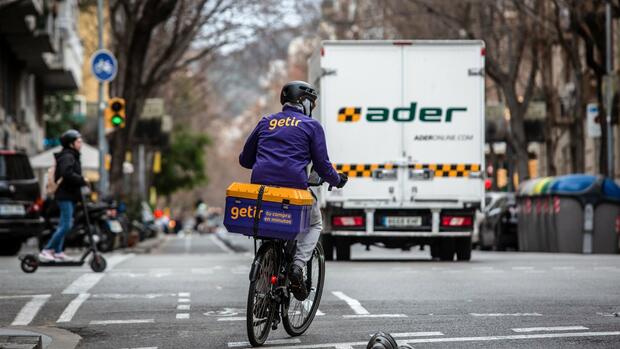Frankfurt, Berlin, Dusseldorf Months after taking over German rival Gorillas, Turkish express delivery service Getir is facing drastic cuts. The company is burning between $80 million and $100 million a month, according to several people familiar with the situation.
In order to contain these losses and convince investors to provide further venture capital, Getir is considering exiting other national markets. In addition, the procurement of the goods to local franchisees is to be switched – away from storage in their own small shops on site, so-called dark stores.
In order to meet investors’ demands for savings, Getir left the Spanish and Portuguese markets at the end of June. Shortly before, the company had withdrawn from France, just like its German competitor Flink.
In the meantime, the company is also said to be toying with the idea of giving up the Netherlands and Italy. This means that Getir would only be active in the home market of Turkey, Great Britain, the USA and Germany – and the expansion course from the Corona period would have failed.
Similar to food retailing, fast delivery services are having a hard time with inflation and slack consumption. Added to this are the high costs of operating the warehouse and the driver fleet.
>> Read more here: Fast delivery service Flink prepares withdrawal from France
According to data service Pitchbook, Getir has raised $2.3 billion from venture capitalists since its inception. Mubadala Investment, Abu Dhabi’s wealthy sovereign wealth fund, is by far the largest lender. The last round so far came about during the corona crisis: In March 2022, Getir received $768 million at a valuation of $12 billion. As Getir remains unprofitable, the company is dependent on further cash injections.
Negotiations are apparently ongoing
That’s why company boss Nazim Salur has been feverishly negotiating with investors for weeks about another cash injection, said several people familiar with the talks. Getir shareholder meetings are planned for next week to discuss possible steps.
Originally, the management is said to have aimed for a sum of 500 million dollars. In the meantime, however, one would be satisfied with half, according to people familiar with the talks. However, no commitments have yet been made. Some of the people involved in the negotiations assume that Mubadala is now only willing to transfer an amount in the almost three-digit million range, possibly in individual installments linked to the achievement of certain savings targets.
>> Read also: Flink is only valued at one billion euros
Getir had already suffered a significant devaluation when it was taken over by Gorillas, down to just seven billion dollars. Experts assume that the devaluation will continue in the event of another round of financing. Similar developments have recently been observed in the market, for example with a financing round by McMakler.
Getir did not want to answer questions about withdrawal from individual countries, financing talks and liquidity bottlenecks, nor comment on problems with suppliers and changes in the business model. Mubadala also declined to comment.
Getir’s range is shrinking
Some time ago, Getir introduced a franchise model in Turkey, in which the individual mini warehouses are operated externally. In the meantime, the fast food delivery service tried to introduce this in Great Britain and Germany as well. They said they hadn’t gotten far to date. Efforts to make the business model more sustainable continue.
For example, Getir intends to work more closely with local retailers in the future and purchase goods from them instead of their warehouses known as Dark Stores. Although this model saves fixed costs for storage, it is considered less efficient with the detour via supermarkets.
In the meantime, Getir probably has problems overall when purchasing the goods. Suppliers are said to have been paid late, according to several people familiar with the situation. Gorillas gets the basic range of its goods from the regional grocer Bünting from East Friesland, and the organic brand Alnatura is also one of the suppliers. Both companies declined to comment when asked.
>> Read also: German and European start-ups receive significantly less venture capital
However, the reduced range is clearly recognizable to the public. Many fresh foods such as fruits and vegetables are currently unavailable in the app. This does not only apply to Germany.
Unlike its rival Flink, Getir lacks purchasing power behind it. The German competitor has this with the Rewe Group, which supplies the products and at the same time has a stake in Flink. Edeka has the same function with the Picnic delivery service.
In the Handelsblatt interview, company boss Lionel Souque still said: “This is a business where it is very difficult to earn money.” Flink has therefore already given notice to 8,000 employees over the past few months, including mainly drivers. After all, Flink received another capital injection of 150 million euros, in which Rewe was the lead investor.
Getir has also cut thousands of jobs since last May, as the data service Layoffs.fyi shows. The figures from Spain and Portugal are not even included.
More: Interview with Rewe boss “The price wars are far from over”
